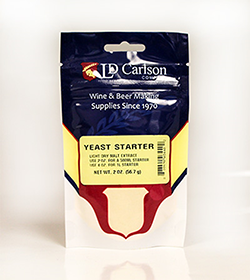Unleashing the Magic of Yeast Starters
Posted by Matteo Lahm on 18th Apr 2023
Imagine yeast starters as the fairy godmothers of the fermentation world, sprinkling their magic dust to transform ordinary homebrews and wines into extraordinary elixirs. In this enchanting guide, we'll delve into the mystical realm of yeast starters and reveal how they conjure cleaner fermentation for beer and winemaking. We'll embark on a journey through the enchanted forest of yeast health and vitality, uncovering the secrets to brewing bewitching beverages. So, grab your wand and let's begin!
Fermentation is the vital process where yeast transforms sugars into alcohol and other byproducts. The quality of this conversion directly influences the taste, aroma, and overall character of your brew. One of the key factors determining the success of this process is the health and vitality of the yeast used. Yeast starters, which are small-scale fermentations prepared before the main event, can significantly enhance yeast health, leading to cleaner and more refined concoctions.
A yeast starter is a small mixture of wort or must (unfermented beer or wine) that is inoculated with yeast several hours or days before introducing it to the main brew. This preparation provides a controlled environment for yeast to multiply and become more active, ensuring a robust and healthy population when added to the main fermentation.
Yeast starters contribute to cleaner fermentation by promoting yeast health and vitality in several ways:
1. Increased cell count: Yeast starters help increase the yeast cell count, ensuring that there are enough healthy yeast cells to perform fermentation efficiently. This helps prevent underpitching, which can lead to slow or stuck fermentations and the production of off-flavors.
2. Improved yeast viability: Yeast starters provide a nutrient-rich environment for yeast to grow and reproduce, enhancing their overall health and viability. Healthy yeast cells are more resistant to stress and better equipped to handle the challenges of fermentation, such as high alcohol levels and temperature fluctuations.
3. Adaptation to fermentation conditions: Yeast starters help yeast acclimate to the specific conditions of the main fermentation, such as the sugar content, pH, and temperature. This adaptation allows the yeast to perform optimally during fermentation, reducing the risk of off-flavors and other fermentation issues.

Cleaner Fermentation Advantages
The use of yeast starters leads to cleaner fermentation in beer and winemaking through the following mechanisms:
1. Faster fermentation start: A healthy and active yeast population from a yeast starter ensures a quicker start to fermentation, reducing the risk of contamination by unwanted microorganisms.
2. Reduced off-flavors: Healthy yeast cells are more efficient at metabolizing fermentation byproducts, such as diacetyl and acetaldehyde, which can cause off-flavors in the final product. This results in a cleaner-tasting beer or wine.
3. Improved attenuation: Yeast starters can improve attenuation, the percentage of sugars converted to alcohol and carbon dioxide. Higher attenuation leads to a more balanced and clean-tasting final product.
4. More flexibility: By starting with a larger population, you can push the limits of cooler temperatures with less risk of stuck fermentation. This gives you more control of the final flavor profile because fermentation temperatures directly affect the ester profile.
Practical Tips for Yeast Starters
To create and use yeast starters effectively in home brewing and winemaking, consider the following tips:
1. Choose an appropriate yeast starter size based on the original gravity of your beer or wine and the desired pitching rate.
2. Use a sanitized container, such as an Erlenmeyer flask or growler, to prepare the yeast starter.
3. Provide aeration and agitation during the yeast starter's growth phase to promote yeast health and reproduction.
4. Allow the yeast starter to ferment for 24-48 hours before pitching it into the main batch.
5. Decant the spent wort or must from the yeast starter before pitching to avoid introducing off-flavors into the main fermentation.
Yeast starters play a vital role in conjuring cleaner fermentation in beer and winemaking by improving yeast health and vitality. By harnessing the power of yeast starters, home brewers and winemakers can ensure a faster fermentation start, reduced off-flavors, and improved attenuation, resulting in a spellbinding final product.


